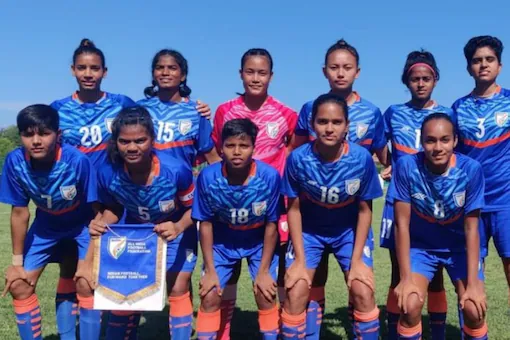AIFF President Kalyan Chaubey outlines a growth plan for women's football
Kalyan Chaubey, AIFF president, has some big goals for growth of women's football, starting with a reduction in the pay gap with their male counterparts. In order to provide a strong supply chain for the national squad, Chaubey also outlined his ambitions to resurrect a few out-of-date competitions.

"We want to have a minimum salary cap for women footballers so that there's not much (salary) disparity with their male counterparts and it's at a respectable level. We also want to make IWL better than before," Chaubey said at a press conference here on Thursday.
"We will also try that there's not much disparity in the honorarium that a player gets when they represent a nation. We want to ensure that their honorarium is also increased."
What Chaubey meant by "honorarium" of the national team players was not clarified. Each member of the men's and women's national teams now receives a daily stipend of about $30 per international match.
The legendary Bembem Devi brought attention to the financial problems of the female athletes last year when she referred to the payment as "peanuts." She had stated in November of last year that "Women players do not get good money while playing for a club in the IWL. The club will always tell the players to take less amount of money, say Rs 50,000 or Rs 60,000. This amount is peanuts actually.”
In terms of prizes, the IWL champions received Rs 10 lakh last season, which was significantly less than the Rs 25 lakh awarded to the I-League team that finished fourth. In contrast, the I-League champions received Rs 1 crore, while the Division 2 winners received Rs 50 lakh. The Under-17 Women's League, which will be organised in collaboration with the Sports Authority of India, was also launched, according to the AIFF chairman.
The FIFA Under-17 Women's World Cup is scheduled to begin in a month, and the AIFF intends to promote the tournament by holding games in 40 locations around India in collaboration with SAI. "In association with the Centre and SAI, we will have at least 40 matches in 40 places so as to promote the event and make people aware of the World Cup," he said.
While the AIFF's new executive committee will decide on the future of the Indian head coach Igor Stimac at its meet here on September 18, Chaubey announced that the national side would play two friendlies against Vietnam and Singapore this month.
Chaubey responded, "This month, we will be playing two matches in Vietnam -- one against Vietnam and one against Singapore," when asked how the federation intended to make the most of the FIFA window for friendlies.
Additionally, Chaubey stated that the AIFF would suggest two former Bengali football players for the Padma Shri and Arjuna Awards this year. "We will submit their names by the September 15 deadline," he said without giving names.
He mentioned a few plans to get back some old tournaments, and said: "One of our targets is to revive the tournaments that we have grown up watching. We have taken a time frame of 100 days to check the feasibility. We will have a U-21 championship along with junior, and sub-junior tournaments.
"India is a big country and no less than a continent, in every 200 kilometers, there is a different language, food, and culture. So in this scenario, if we are able to revive the Santosh Trophy, it can become hugely popular. The tournament can be the main platform for the domestic players from where they can come and play for the Indian team," he said.
The key to success is to discover potential early, and Chaubey said that introducing football to government-run schools wouldn't need any technical knowledge. To capture kids young in the age range of 6 to 12 years, the AIFF chief aims to employ trained licensed-holder coaches at state-run schools throughout India. "There are about 16 lakh government schools in India where they have football grounds with 25 crore children," he said giving his rounded value.
"We want to send AIFF licensed coaches to the schools to help improve the grassroots level. When you help create the basics from the age of 6-12, then from the age of 13-18 they will play at the youth level for match exposure.
"We want to include football into a school syllabus so we can have a footballer with the same basic skills be it in Andaman, Goa or Maharashtra," he said.

Comments
Sign up or log in to your account to leave comments and reactions
0 Comments